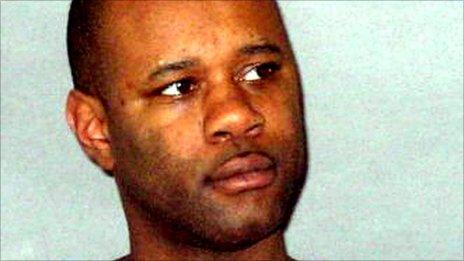Why did my rapist's lawyer reveal my medical records?
- Published

Sarah Scott was raped by Adrian Ruddock in 2011
Campaigners have welcomed a ruling by a senior judge that abuse victims should be able to access legal aid to fight attempts by lawyers to obtain their medical records.
Here Sarah Scott describes the shock she experienced when details of her medical history, which were so personal her own mother did not know about them, were brought up in court by her rapist's QC.

My name is Sarah. I live in the north east of Scotland. I am a mother. I am a rape survivor.
In May 2011, my rapist, Adrian Ruddock, was convicted at the High Court in Aberdeen and sentenced to eight years imprisonment.
In the days that followed my rape, I struggled to cope mentally and emotionally. I didn't want to deal with it - I couldn't. The pain, the trauma, it consumed me.
This culminated in me attempting to end my life. I was admitted to A&E and given life-saving treatment.
It was here, in my fragile mental state - still dazed, confused, traumatised, still bleeding from the tears when he ripped me open - that I was given a piece of paper to sign by police officers.
It was a consent form for my medical records to be used as evidence. I wasn't given any legal advice, I wasn't even offered a choice. It was handed to me and I was to sign it.
I was never told what this information would be used for. I was certainly never told that my rapist's QC - Ronald Renucci - would broadcast personal information from my childhood in court.
I tried to prepare myself in the months that followed for giving evidence. I made detailed notes - I filled notebooks with everything that could be asked of me in court.
I was determined to be prepared for everything and anything. But I placated myself with the belief that legislation would prevent my rapist's QC from attacking my character. I was wrong. Very wrong.
Giving evidence can only be described as re-victimisation and secondary violation. In other words: being raped all over again.
I knew that I would have to tell the court in chilling detail precisely how this man violated me, I knew the defence were going to paint me as some scorned temptress, I knew it was going to be difficult.

Sarah gave evidence at the High Court in Aberdeen
Look, to the world I epitomise the old cliche of "asking for it". I am the perfect imperfect rape victim. I was drunk. I was wearing a short skirt. I knew the man who attacked me. I willingly, albeit under false pretences, went back to his home.
But nothing prepared me - or rather, no one prepared me - for the fact that my previous mental health records were going to be lambasted in a courtroom full of strangers.
While cross examining me, Renucci asked something that shocked me. He asked me if I had ever self-harmed in the past.
Incredibly personal
I was confused. I was angry. I didn't understand. When I was a young teenager - around 13-years-old - I was bullied at high school. I was depressed.
I resorted to self-harm to deal with my pain. I had only confided this detail to a school psychologist, maybe my doctor. I hadn't even told my own mother.
But here, at the trial of my rapist - some seven or more years later - this incredibly personal information was being broadcast to all - journalists, the jury, the judge, and worst of all, the man who only five months prior had repeatedly raped me.
I am sure he could see the colour drain from my face, I am sure everyone could. My heart felt like it had 1,000 anchors pulling it to the ground. I wasn't prepared for this.
All those hours of taking notes and I didn't see this coming. I was blindsided. Completely blindsided. I looked around, desperate for someone to save me, to help me, to see that this was not right. But it was in vain. I proclaimed something along the lines of: "Do I have to answer that?".
The judge, Lord Bracadale, told me that I did, in fact, have to answer. He told me that only the prosecution were allowed to object to a line of questioning. They didn't.
So there, alone, I had to tell the world that when I was a little bullied girl I cut myself to deal with the pain.
Normally in life when someone is verbally attacking you and your identity and character you can walk away. You can ignore them. You can leave the room. I couldn't do this. I had to answer his questions.
Not unique
I was so traumatised that I didn't want to go back in that courtroom. I told staff that I was running away. I was told I had no choice - a warrant for my arrest would be issued otherwise.
It sounds cliche, but I truly did feel like I was on trial - I was on trial for being raped.
Why were my mental health records brought up in court that day?
My rapist was convicted after a majority verdict. I will never know how many of those jurors thought that I was lying. I will never know what their reasons were, but in my mind it's clear: it's at least in part because of those medical records. I may be wrong, but that's truly what I believe.
My experience is not unique: since my assault, I have spoken to countless survivors who have experienced the same thing I have. It's not right. It's not fair. It cannot continue. Something has to change.
- Published12 February 2016

- Published30 June 2011
